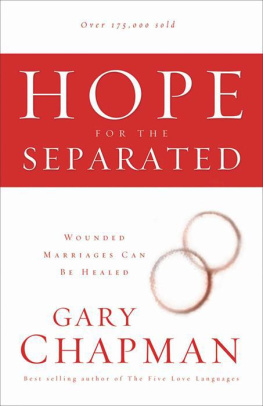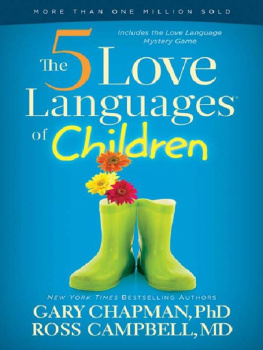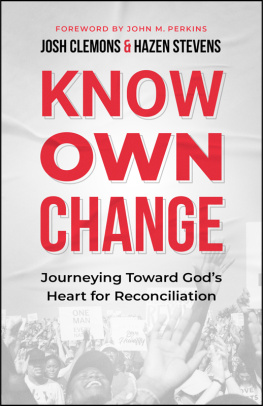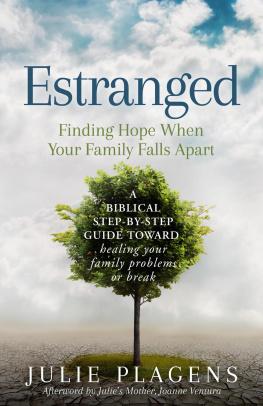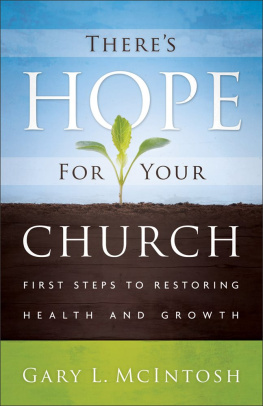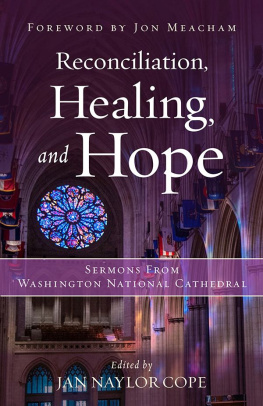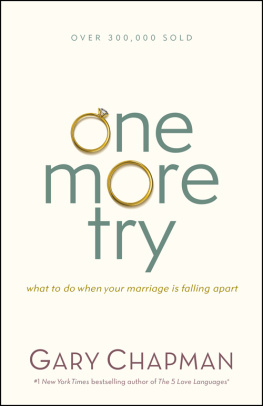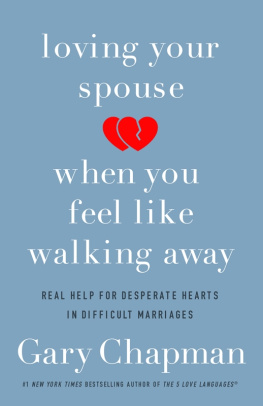HOPE
FOR THE
SEPARATED
WOUNDED
MARRIAGES CAN
BE HEALED
GARY
CHAPMAN
M OODY P UBLISHERS
CHICAGO
To the many couples
who, in the pain of separation,
accepted the challenge of
seeking reconciliation, and allowed
me to tell of their journeys
CONTENTS
ACKNOWLEDGMENTS I am deeply indebted to the many separated individuals who have shared their struggles with me. Out of the midst of the ambivalent feelings of love and hate, relief and pain, anger and concern, many of them have pursued the high road of reconciliation. Not all have succeeded, but all have matured. I have watched them deal responsibly with failure and rise to face the future with confidence. Their example has served to encourage me in the writing of this volume, which is designed to point the way to hope.Sincere appreciation is expressed to Debbie Barr Stewart and Tricia Kube, both of whom gave liberally of their expertise in editing and typing the manuscript. INTRODUCTION F or the past thirty years, I have tried to help people with troubled relationships. Many of those who have come to my office entered at the point of marital separation. The stress level in their marriage reached a point where one spouse had walked out. The pain of separation and the real possibility of divorce drove them to seek help. Usually they arrived at my office having lost hope. Part of my role as a counselor is to provide hope. In this revised edition of Hope for the Separated , I desire to share with you what I have learned during those thirty years of counseling separated individuals. Please know that you are not alone. Thousands of people experienced marital separation last year. I am certain that many of them sincerely want to know, What should I do, as a Christian? This book is an attempt to answer that question. It does not contain easy answers or rigid formulas. There is no simple medication for a marriage diseased to the point of separation. But for those who really want help, even if the medicine is hard to swallow, read on. Your chances of recovery are good. For pastors, lay counselors, and relatives who want to help those in the throes of separation, I have sought to give practical, biblical answers in language that everyone can understand. A number of helpful books have been written for the divorcee, but none, in my opinion, deals adequately with the individuals struggle during the separation period. It is not to be assumed that separation always leads to divorce. Separation may just as well lead to a restored, enriched, growing marriage. The individuals involved must determine the outcome of separation. In this book we want to look realistically at both alternatives. Separation is not permanent. It is a time of transition leading to either a restored marriage or divorce. In either event, we must make the most of the process. The assignments at the conclusion of each chapter will help you take specific steps toward incorporating ideas into your life. Ultimate value comes not in reading but in applying truth. An ancient sage once said, The journey of a thousand miles begins with one step. I hope this book will help you take that step.
O NE
WHAT HAPPENED TO OUR DREAM?
T o separate or not to separate, that was the question. That question was settled when one of you left and took up residence at a separate location. Clothes and personal belongings may not have been moved, but you began living apart. Separated. The very word may bring fear to your heart, and you may not like it, but you are separated. You may as well say it: I am separated.
Separation is not death, although it is most certainly the valley of the shadow of death (Psalm 23:4). It is so similar to death that you may feel the same grief and pain experienced by those who release a loved one to death. But the shadow of death is not to be equated with death itself. Separation may be the valley of restoration, and the pain you feel may be the labor pains that will give rebirth to your marriage. On the other hand, separation may be the beginning of the end. The fruit of your separation will be determined by what you and your spouse say and do in the next few weeks and months.
In a very real sense, separation calls for intensive care, much like that given to one in grave physical danger. The condition of your marriage is critical. Things can go either way at any moment. Proper medication is essential, which is the purpose of this book. Surgery may be required. That will call for the services of a counselor or pastor. What you do in the next few weeks will determine the quality of your life for years to come. Be assured, God is concerned about the outcome. You can count on Him for supernatural help.
Separation is not the time to capitulate. The battle for marital unity is not over until the death certificate is signed. In most states you have six to twelve months in which to wage war on the enemy of your marriage. The dreams and hopes you shared when you got married are still worth fighting for. You married each other because you were in love (or thought you were at the time). You dreamed of the perfect marriage in which each made the other supremely happy. What happened to that dream? What went wrong? What can you do to correct it?
The dream can live again. But not without workwork that will demand listening, understanding, discipline, and changework that can result in the joy of a dream come true.
I know some of you are saying, It sounds good, but it wont work. Weve tried before. Besides, I dont think my spouse will even try again.
Perhaps you are right, but do not assume that the hostile attitude of your spouse will remain forever. One of the gifts of God to all men and women is the gift of choice. We can change, and that change can be for the better. Your spouse may be saying, Im through. It is finished. I dont want to talk about it! Two weeks or two months from now, however, your mate may be willing to talk. Much depends on what you do in the meantime, and much depends on his or her response to the Spirit of God.
Others of you are saying, Im not sure that I want to work on this marriage. Ive tried. Ive given and given. It wont work, and I may as well get out now! I am deeply sympathetic with those feelings. I know that when we have tried again and again without success, we may lose our desire to try once more. We see no hope, so we conclude that we have no alternative but to give up. Our emotions no longer encourage us to work on the marriage. That is why I never ask people, Do you want to work on your marriage? I always ask, Will you work on your marriage? At the point of separation, we have lost much of our want to. We must remember our values, our commitments, and our dreams, and we must choose to do what must be done to be true to them.
Where shall we go for help? For those who are Christians, there is one stable source to which we turn when we need guidance. That source is the Bible. Non-Christians may or may not turn to the Bible, but the Christian is drawn by the Spirit of God to the Scriptures. In the Bible, we find not only what we ought to do, but also the encouragement to do it. Even the non-Christian who sincerely seeks help in the Bible can find meaning in Pauls statement, I can do all things through [Christ] who strengthens me (Philippians 4:13). When we come to Christ, we find the outside help we need to do what our own resources are inadequate to accomplish.
When we turn to the Bible for guidance on marriage, we see two road signs: one marked Wrong Way, the other Detour. On the sign marked Wrong Way appears the word divorce. On the sign marked Detour appear the words marital unity. Let us explore the meaning and direction of those two signs.
According to the Old and New Testaments, divorce always represents the wrong way. In the beginning, when God told Adam and Eve, Be fruitful and multiply, and fill the earth (Genesis 1:28), He never gave the slightest hint that the marital relationship was to be anything but lifelong. The first mention of divorce in the Bible is found in the writings of Moses hundreds of years after mans creation (Leviticus 21:14; 22:13; Numbers 30:9; Deuteronomy 24:14). Moses permitted divorce, but it was never condoned or encouraged by God. Jesus later explained to the Pharisees that Moses had permitted divorce only because of their hardness of heart (Matthew 19:8) but that from the beginning divorce was not Gods plan. Jesus affirmed that Gods intention was monogamous, lifelong marital relationships. When God instituted marriage, divorce was not an option. God did not create divorce any more than He created polygamy. Those were mans innovations. In Gods sight, those innovations are always clearly wrong.
Next page
